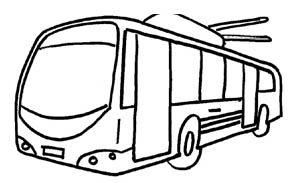Monday, May 22, 2006
Stop the Folly. Save the Trolleys!

It has come as quite a surprise that the Greater Wellington Regional Council is openly discussing getting rid of our iconic trolley buses in favour of dirty diesel buses. The buses existence in Wellington is threatened because of funding and contract disputes between the main players involved with their running, funding and maintenance.
Most would agree that the buses are a unique and special part of Wellingtons landscape and would like to see them stay on our streets. This week, three Wellington MPs, from across the political spectrum, Nationals Mark Blumsky, Labours Marian Hobbs and Green MP Sue Kedgley came out in support of our beleaguered trolley buses, urging for the conflict to be resolved.
The major issue is that Land Transport New Zealand (LTNZ), who is mandated to promote sustainable transport, will not fund the buses fairly compared with diesel buses, threatening their survival. LTNZ currently pays half of the operating costs for the trolley buses, but only to the level of half the equivalent costs of running a diesel bus, leaving a funding shortfall that the Regional Council has to pick up. Obviously trolley buses have different costs associated with them such as the overhead wire and electric substations, which require urgent upgrades. This funding shortfall is roughly one million dollars and is picked up by the Wellington Regional Council. Councillor Glen Evans has said that Wellington will lose its buses if ratepayers do not pick up this shortfall, which translates to 2% of rates.
Why should we keep our trolley buses? Our Trolley buses are the envy of other cities in New Zealand, are cleaner, greener and quieter than diesels. The Trolley buses run on electricity, primarily from renewable energy, and when project West Wind comes on board will run on electricity powered by the wind. With Meridian's planning to build 70 turbines at Makara producing approximately 210 megawatts of electricity or more than Wellington's electricity usage. Wellington's fleet of 60 trolley buses would use less than half the electricity produced by one of these turbines. We would have a fleet of buses powered by the wind, capitalizing on our regions famed asset. Having a public transport fleet powered by a non-polluting energy source, Wellington can brand its self as the capital of a clean, green New Zealand. Making the saying a reality not just a marketing slogan. In other countries, public participation of public transport has declined up to 15% in cities where trolley buses have been switched in favour of diesel.
Trolley buses are better than diesel buses and do not pollute Wellington or contribute to climate change. Some commentators have suggested that Wellington does not have a pollution problem because it is too windy here, therefore we should not worry about diesel exhaust emissions. I don't know if you've ever been hit full in the face by a big black cloud of smoke from a diesel bus exhaust as it drives past? I have and it is not a pleasant experience. Just because our pollution blows away, unlike Christchurch, is not an argument to continue producing it.
Then there is diesel's impact upon the world's climate. Diesel buses produce carbon dioxide; a climate changing greenhouse gas, which most scientists unanimously agree is one factor in human induced global warming. The 60 trolley buses
in Wellington saves 600 000 litres of diesel or 1620 tonnes of carbon
dioxide, if they were diesel buses. With climate change science now only rejected by those on the fringes, and New Zealand signing the Kyoto protocol, it just does not make sense to get rid of the trolleys and encourage burning more climate changing
fossil fuels. Transport makes up 40% of New Zealand's C02 emissions, and
scientists have been saying we may not have long left to reduce our
greenhouse gas emissions.
The Trolleys are an essential part of Wellington and are a necessary part of sorting out our transport woes. It appears that our regions decision makers are stuck in a 1960s mindset where every problem requires either burning more fossil fuels or building larger and larger roads. Instead of encouraging walking, car –pooling, cycle lanes, traffic demand management and green car share ownership schemes our Regional Council pushes through the Te Aro bypass, Transmission Gully and now plays with switching the Trolleys to diesel buses.
Trolleys are the greenest public transport option available and our public leaders need to stop dithering and act to resolve the funding crisis between Stagecoach, Vector, Land Transport New Zealand and the Greater Wellington Regional Council. Would this council like to go down in history as the council that lost the trolley buses? I don't believe this decision would be rewarded at the election booths come 2008. Any long-term strategic view incorporating the issues of international oil insecurities, rising oil prices, climate change and peak oil would recognise the trolleys importance. Maintaining the fleet gives us security of transport and is part of future proofing of country against external shocks.


